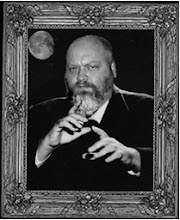Because you asked... What is Asatru?
 From Steve McNallen's Asatru Folk Assembly website:
From Steve McNallen's Asatru Folk Assembly website:Asatru is an expression of the native, pre-Christian spirituality of Europe. More specifically, it is the Way by which the Germanic peoples have traditionally related to the Divine and to the world around them.
From Iceland to Russia, from the frozen north of Scandinavia to the Mediterranean, the Germanic peoples wandered and settled over a span of thousands of years. Today, their descendants are spread around the world. We may refer to ourselves as Americans or English, Germans or Canadians, but behind these labels lurks an older, more essential identity. Our forefathers were Angles and Saxons, Lombards and Heruli, Goths and Vikings - and, as sons and daughters of these peoples, we are united by ties of blood and culture undimmed by the centuries.
Asatru is our native Way. Just as there is Native American religion and native African religion, so there is native European religion. Asatru is one of its expressions. It gave our ancestors comfort in millennia past, and it can give us strength and inspiration today.
The word "Asatru" comes to us from Old Norse, the tongue of ancient Scandinavia, where it means "those loyal to the Gods." Since the ancient Scandinavian version of our Way is the best documented, it has given us much of Asatru's terminology and imagery. The soul of Asatru, however, is not confined to the Scandinavian model, but encapsulates the belief of all the Germanic peoples. Indeed, Asatru reflects the deeper religiosity common to virtually all the nations of Europe.
As a part of the great European Folkway, Asatru has a number of characteristic beliefs. Some of these are:
The world is good.
Prosperity is good.
Life is good, and we should live it with joy and enthusiasm.
We are free to shape our lives to the extent allowed by our skill, courage, and might.
There is no predestination, no fatalism, no limitations imposed by the will of any external deity.
We do not need salvation. .. all we need is the freedom to face our destiny with courage and honor.
We are connected to all our ancestors. They are a part of us. We in turn will be a part of our descendants.
We are also linked to all our living kin - to our families and to every man and woman rooted in the tribes of Europe. They are our "greater family."
We are connected to Nature and subject to its laws. The Holy Powers often express themselves in Nature's beauty and might.
We believe that morality does not depend on commandments, but rather arises from the dignity and honor of the noble-minded man and woman.
We do not fear the Holy Powers, or consider ourselves their slaves. On the contrary, we share community and fellowship with the Divine. The Holy Powers encourage us to grow and advance to higher levels.
We honor the Holy Powers under the names given them by our Germanic/Norse ancestors.
We practice Asatru by honoring the turning of the seasons…the ancestors…the Divine…and ourselves - in everyday life.
Asatru is about roots. It's about connections. It's about coming home.


0 Comments:
Post a Comment
<< Home